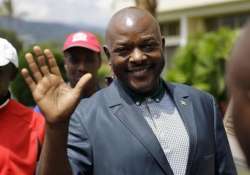Burundi president makes first appearance since failed coup
Burundi President Pierre Nkurunziza has made his first appearance in the capital since the attempted coup against his government last week.Nkurunziza made a brief statement to journalists in the foyer of his heavily guarded presidential

Burundi President Pierre Nkurunziza has made his first appearance in the capital since the attempted coup against his government last week.
Nkurunziza made a brief statement to journalists in the foyer of his heavily guarded presidential offices in Bujumbura Sunday morning. He did not mention the failed coup plot or the protests that have rocked Burundi for weeks over his bid for a third term in office.
Instead he described how he contacted the presidents of nearby African countries to discuss the threat from Somalia's Islamic extremists, al-Shabab.
Burundi, Kenya and Uganda contribute troops to the African Union force in Somalia that is fighting al-Shabab. The extremist rebels have retaliated by carrying out violent attacks in Kenya and Uganda.
"You know that Burundi is among the countries that are contribute troops in Somalia and that's why I came here to contact my friends and my fellow presidents in Kenya and Uganda and these countries are being targeted by al-Shabab," Nkurunziza said in French.
He said his aim in contacting fellow presidents was to find strategies to stop threats to the security of Burundians.
Edouard Nduwimana, Burundi's interior minister, called on protesters not turn up on the streets Monday because the security forces would not be able to differentiate between protesters and extremists.
Speaking on state radio, Nduwimana said the security agencies had received information of extremists with explosives who could detonate them during the street protests.
Mohammed Nibaruta, an opposition activist, said this is another way for the government to justify the illegal use force to discourage the demonstrations over Nkuruniziza's candidacy which goes against the constitution's limit of two five-year terms.
"The government is going to use live bullets but this will not stop protesters from coming to the streets tomorrow and the day after until Nkurunziza withdraws his candidacy," Nibaruta said.
The protests began April 26, a day after the ruling party made Nkurunziza its presidential candidate, and at least 15 people have been killed in the unrest.
Nkurunziza was in neighbouring Tanzania on Wednesday when a general announced a coup. Loyal forces crushed the rebellion and Nkurunziza returned to the country, but he had not been seen in the capital.
The coup attempt came after weeks of street protests against Nkurunziza's efforts to stay in power by standing in elections for a third term in office.
Seventeen security officials, including five generals, accused in the attempted coup appeared Saturday before a prosecutor who charged them with an attempt at destabilizing public institutions, lawyers of some of the suspects said. The general who announced the coup, however, remains at large.
In Rome on Sunday, Pope Francis called for a sense of responsibility to prevail in Burundi following the attempted coup. "I would like to invite you to pray for the dear people of Burundi, which is undergoing a delicate moment: May the Lord help all to avoid violence and act responsibly for the good of the country," he said.
More than 105,000 Burundians have fled to neighboring countries recently, according to the U.N. The U.N. refugee agency said Sunday seven Burundi refugees had died in a camp in neighboring Tanzania since Wednesday of severe diarrhea and two cases were suspected to have been caused by cholera.